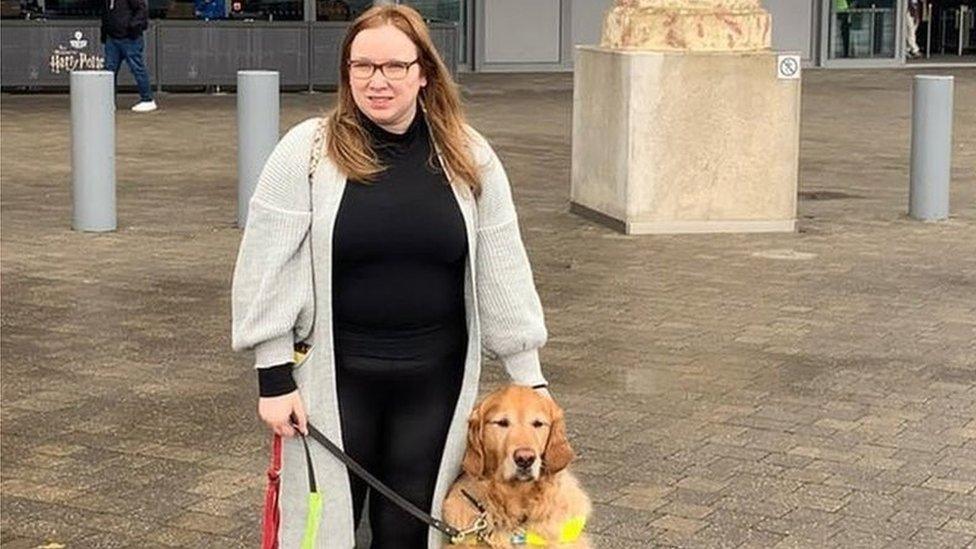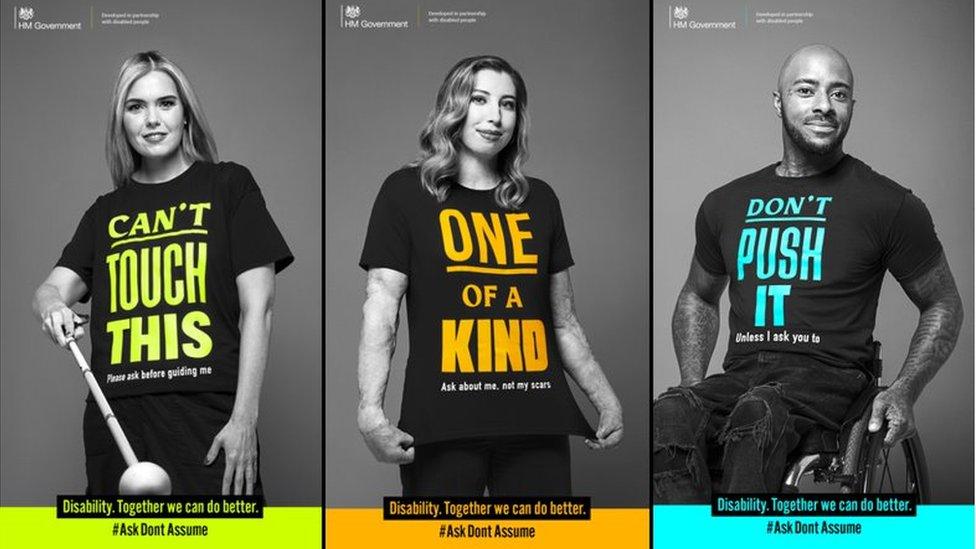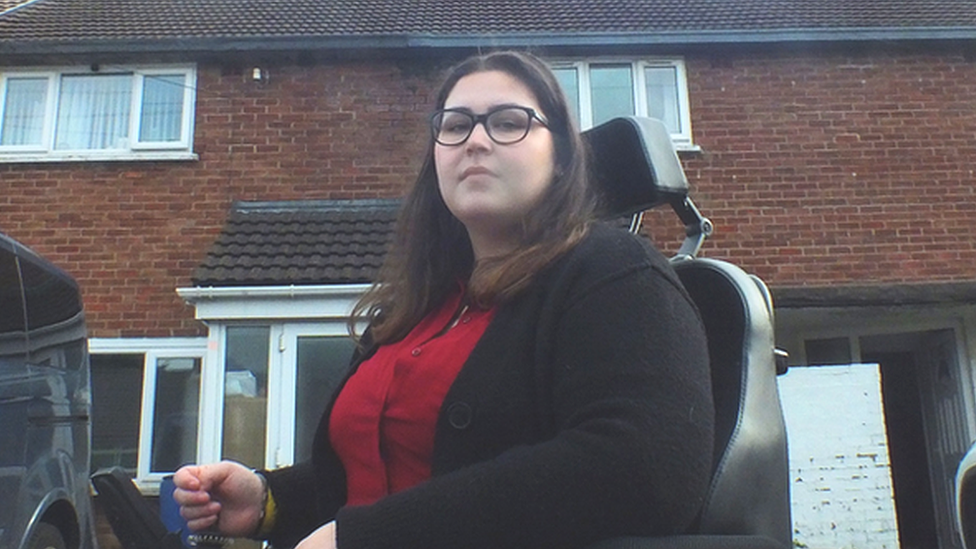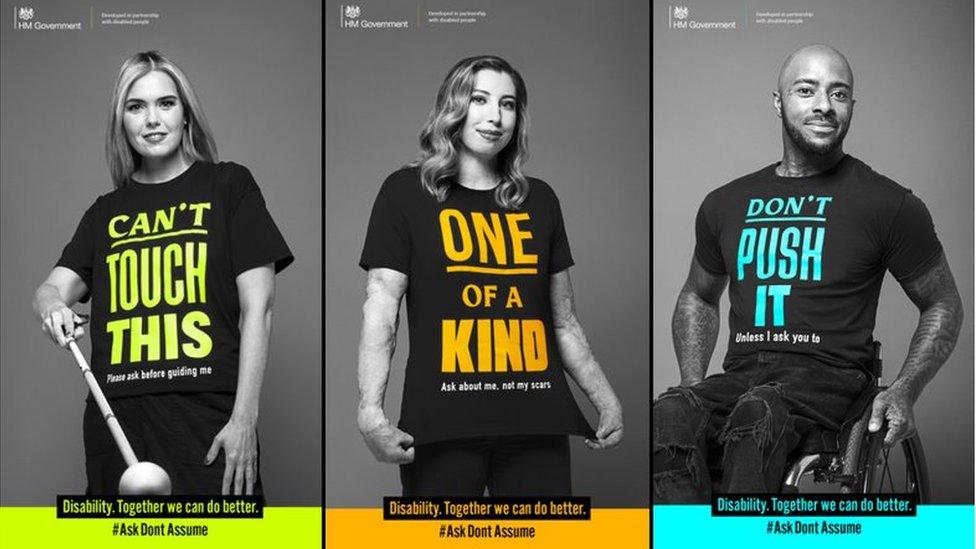Wheelchair user feels 'violated' by disability comments
- Published
'Someone asked if they could pray for me
"What's wrong with you? What's happened? I get that every day I go out."
Wheelchair user Bethany Handley, 24, faces intrusive questions every day and has even been pushed out of the way by strangers.
"I just want to be able to go about my daily life without my human rights getting violated," she said.
Disability Wales said unwelcome interactions with disabled people were on the up.
Ms Handley, a writer and a full-time wheelchair user from Monmouth, gets unwanted intrusions every time she goes out.
She said: "When I was walking, obviously, never would anyone come up to me and be like, 'tell me all about your medical records? Can you tell me about your trauma'?"
She said strangers had offered to pray for her while she was enjoying coffee with a friend and in another incident a restaurant manager pushed her from her table when it was needed for another customer.
She said: "I said I was fine [without assistance] and then he physically pushed me out of the restaurant. I understood he needed the table, but he failed to acknowledge my agency and that's really violating."
Bethany has now paid for handles that fold down into her wheelchair "so people can't just come and move me".
Her advice to non-disabled people thinking about asking someone about their impairment is "don't do it" and if you want to offer help, "just make sure you are open to the response of the disabled person".

Angharad Paget-Jones says she has been challenged by strangers about needing her guide dog, Tudor
Angharad Paget-Jones, 30, is severely sight-impaired and knows all about unwanted interactions.
"Recently, I've become quite visibly pregnant and I was approached in a small shop. I was told I was disgusting for being pregnant, knowing I'm disabled," she said.
Ms Paget-Jones, a disability campaigner from Port Talbot, said she had also been stopped in the supermarket while using assistive technology and challenged about why she needed her guide dog Tudor.
"You do get the odd one that's really intrusive like, 'so what's wrong with your eyes? Why do you need a guide dog'?"
She said people often touched Tudor without her consent, adding: "I think people feel entitled, like you're public property when you're disabled."

The UK government's Ask, Don't Assume campaign has faced a backlash after claims it is leading to more unwanted interactions for disabled people
A new UK government campaign aimed at addressing the problem of unsolicited advice or assumptions surrounding disability has faced criticism online.
Critics claim the Ask Don't Assume campaign and its hashtag #AskDontAssume could actually lead to disabled people being asked more intrusive questions.
Disability Wales said unwanted interactions were increasing "especially on the back of recent campaigns like the Ask Don't Assume campaign".
Its disability equality officer Alex Harrison said the campaign's intended message had got lost.
"It's not just asking us do we need any assistance, now we get asked 'what's your health condition? What can or can't you do'?" she said.
"Disabled people don't want to go through this four or five times a day, and there is no need for people to know these things."
She acknowledged that often people wanted to help, but said there were better ways to do it.
The UK government said claims negative interactions were increasing because of its campaign were "baseless and lack any specific supporting evidence".
A statement from the government's Equality Hub said the campaign had a "clear message, encouraging people to listen to disabled people and not assume their capabilities".
It added that the project was in its pilot stage and it was "far too early to measure the impact of the campaign nationally".


TRAIN, COMPETE, SLEEP AND REPEAT: Welcome to the world of competitive ballroom dancing
INVISIBLE DISABILITIES: Spreading awareness and helping others

Related topics
- Published26 October 2023

- Published29 September 2023
